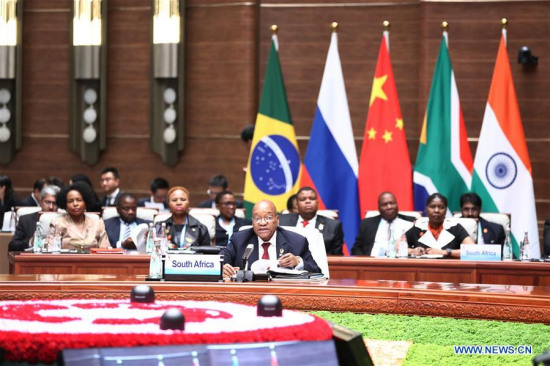
South African President Jacob Zuma speaks at the ninth BRICS summit in Xiamen, southeast China's Fujian Province, Sept. 4, 2017. (Xinhua/Ju Peng)
African leaders said at the BRICS Business Forum that ended Monday that the continent hopes to become a new growth pole through cooperation with BRICS countries, namely Brazil, Russia, India, China and South Africa.[Special coverage]
About 1,200 business elites from more than 600 enterprises gathered in Xiamen of southeast China's Fujian Province to attend the BRICS Business Forum. The two-day forum that started Sunday is an important side event of the BRICS summit.
South African President Jacob Zuma and Egyptian President Abdel Fattah al-Sisi delivered speeches at the forum, while Guinean President Alpha Conde attended a panel discussion under the theme of interconnectivity.
SUSTAINABLE DEVELOPMENT, ROBUST TRADE
In a speech delivered Sunday, Zuma said he hopes BRICS countries can enhance cooperation to make their economies more robust and sustainable and bring benefits to their people.
Amid a decrease in global demand for raw materials, South Africa, whose exports are mainly driven by raw materials, are facing great challenges, Zuma said.
Against such a backdrop, South Africa hopes to realize comprehensive and inclusive development through cooperative projects with other BRICS countries, he added.
South Africa is carrying out large-scale economic reform in efforts to spur economic growth, Zuma said, adding that such sectors in mining, agriculture and energy are eying more investment while other areas such as technology and infrastructure construction are also prioritized.
Besides, Zuma expressed the hope that trade with high added value among BRICS countries can be promoted.
As Africa's main economy and a member of BRICS and the G20 group, South Africa's trade with the other BRICS countries reached 31.2 billion U.S. dollars in 2016, according to Zuma.
Describing Africa as a new frontline of growth and prosperity, Zuma said the continent enjoys broad prospects and opportunities for investment.
The International Monetary Fund has predicted that Africa will become the continent that sees the second fastest growth in the world in four years and it is the "youngest" continent in terms of the population's age.
Zuma quoted a McKinsey report as saying that spending by Africa's consumers and businesses along with household consumption in the continent will exceed 5 trillion U.S. dollars by 2025.
Zuma also mentioned the New Development Bank's Africa Regional Center that launched in mid-August in Johannesburg, saying that the project highlights BRICS' commitment to the development of the African continent and emerging markets.
Al-Sisi also said Egypt has adopted a series of policies for reforms in the subsidy system, social security and monetary policies as well as improving the investment and business environment, and expressed the hope that the country can realize sustainable development through BRICS countries' support.
SOUTH-SOUTH COOPERATION
During the Xiamen Summit, China will hold the Dialogue of Emerging Market and Developing Countries, where leaders of Egypt, Guinea, Mexico, Tajikistan and Thailand will join the BRICS leaders in discussing global development cooperation and South-South cooperation.
"BRICS is symbolic of the South, but it really, for its legitimacy, needs to embrace other countries of the South so that their voices can be heard" on the global stage, said Jeremy Stevens, an economist with Standard Bank, Africa's largest bank headquartered in South Africa.
Conde, the Guinean president, said the attendance of Guinea, which holds the rotating presidency of the African Union, in the Xiamen summit has great significance to Africa.
The development of BRICS cooperation has brought hope to all marginalized countries in the world, Conde said, adding that he expected the partnership between Guinea and BRICS countries will make Africa a new landscape.
Guinea is one of the least developed countries in the world, according to the United Nations. Cooperation with BRICS nations has injected great dynamism into the Guinean economy.
Statistics from the Chinese Customs showed the China-Guinea trade in 2016 reached 1.78 billion U.S. dollars, up 36.2 percent from a year ago.
"Africa is the future of the world," Conde said, "The future of BRICS is determined by cooperation with Africa...let's jointly face our challenges."


















































